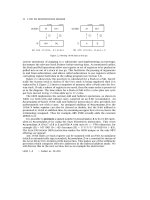Tài liệu Guidelines for the appointment of General Practitioners with Special Interests in the Delivery of Clinical Services pdf
Bạn đang xem bản rút gọn của tài liệu. Xem và tải ngay bản đầy đủ của tài liệu tại đây (56.1 KB, 11 trang )
Guidelines for the appointment of
General Practitioners with Special Interests
in the Delivery of Clinical Services
Sexual Health
April 2003
Sexual Health
1
Sexual health
This general practitioner with special interest (GPwSI) framework is one of a
number which the Department of Health has commissioned the Royal College of
General Practitioners (RCGP) to produce. The frameworks have been written
following extensive consultation with general practitioners, secondary care
specialists, Primary Care Trust managers, patients, the Department of Health and
the PwSI team in the NHS Modernisation Agency. The frameworks are intended
to be advisory for the development of local services, providing good practice and
experience, offering recommendations to assist PCOs in determining how to
implement a local GPwSI service to meet their needs.
This guidance should be read in conjunction with the Department of Health and
Royal College of General Practitioners’ Implementing a scheme for General
Practitioners with Special Interests (April 2002, www.doh.gov.uk/pricare/gp-
specialinterests), and the NHS Modernisation Agency’s Practitioners with Special
Interests: A Step by Step Guide To Setting Up a General Practitioner with a
Special Interest (GPwSI) Service (April 2003, www.gpwsi.org).
Rationale for GPwSI service in sexual health
The risk of unwanted pregnancy and the risk of sexually transmitted infections are
often associated with each other. Evidence showing associations between mental
ill-health, drug and alcohol problems and sexual ill-health and high-risk sexual
behaviour supports the need for a GPwSI to take a broader approach to sexual
health.
a. The core activities of a GPwSI service in sexual health
It is recommended that the National Strategy for Sexual Health and HIV
(www.doh.gov.uk/nshs/bettersexualhealth.pdf) and the subsequent Tool Kit for
Primary Care Trusts
(www.doh.gov.uk/sexualhealthandhiv/pdfs/commissioning_toolkit.pdf) should
underpin the development of a GPwSI service.
The activities of a GPwSI service will depend on a number of factors, including
the location of the service and its overall aims. In principle ,the main activities of
the service will be based around education and improving standards of sexual
health medicine within the primary care organisation as well as offering sexual
health services. As best practice, it is recommended that GPwSI services include
elements of the following:
Clinical Service
Offering Level 1 services with some additional Level 2 services (see table 1).
These services can be offered either as part of an integrated general practice
service with care being provided alongside other general medical services or as a
stand-alone service located within a dedicated sexual health clinic within the NHS
Sexual Health
2
or other provider and either targeted to a particular population or risk group (e.g.
young people, drug users, hard-to-reach groups) or provided to a general
population.
At the time of writing much work has been done to ensure that GP practices are
able to provide level 1 services. Therefore an initial role of a GPwSI service may
be to support this further.
Further activities of the GPwSI service depend on the needs of the Primary Care
Organisation (PCO) and can include provision of: -
• Enhanced Family Planning services.
• Menopause care.
• Infertility care.
• Service to raise the awareness and respond to the needs of women who
have undergone female genital mutilation.
• Vasectomy services.
• Psychosexual counselling.
Education and Liaison
This usually involves dissemination of good practice across the PCO training and
education, liaison with local specialist providers, and local laboratories.
Service Development/Leadership
• Contribute to the strategic direction of local sexual health services in
particular lead implementation of the National Strategy; participate in the
monitoring of outcomes and support development of integrated services.
• Provide sexual health clinical leadership for primary care in order to
champion change.
Sexual Health
3
The National Strategy for sexual health and HIV.ational for sexual health and
Level 1 Services
Sexual history and risk assessment.
Sexual Transmitted Infections testing for women.
HIV testing and counselling.
Pregnancy testing and referral.
Contraceptive information ad services.
Assessment and referral of men with STI symptoms.
Cervical cytology screening and referral.
Hepatitis B immunisation.
Level 2 Services
Intrauterine device insertion.
Testing and treating sexually transmitted infections.
Vasectomy.
Contraceptive implant insertion.
Partner notification.
Invasive sexually transmitted testing for men (until non-invasive tests are
available).
The RCGP is of the view that a Level 1 service should also include the ability to
provide a confidential service and a service accessible to young people.
New draft GMS contract
The new draft GMS contract includes a number of quality markers relevant to
sexual health medicine. The GPwSI would have an important role in helping
practices reach the quality targets as well as supporting PCOs in developing and
monitoring Enhanced services.
b. The core competencies recommended for the GPwSI service
These will depend on the core activities of the service provided though a GPwSI
should be able to demonstrate elements of those listed below.
Generalist
The competencies to deliver a GPwSI service should be seen as a development of
generalist skills including good communication skills, competence in teaching and
training health care professionals and a commitment to cascading knowledge and
skills.
and
Special interest area
A GPwSI would be expected to be competent at providing all Level 1 services to a
high level of expertise.
Sexual Health
4
Competencies Clinical Education and
support
Leadership
Knowledge
of:
Local and national
epidemiology,
presentation, natural
history, complications,
investigation, treatment
(including antibiotic
resistance) of the
common Sexual
Transmitted Infections
and vaginal infections.
Harm reduction and
harm minimisation in
relation to illicit drug
use, especially injecting
drug use.
Use and
contraindications of the
full range of
contraceptive techniques.
Methods for TOP, their
relative advantages and
disadvantages indication
and contraindications.
Understanding of the
different test for STIs
including storage and
transport of specimens.
Understanding of
practice based methods
of record keeping and
how these may support
audit.
Indicators of sexual
health risk.
Local STI and
Family Planning
services and
supports available.
Good knowledge of
local guidance in
relation to treatment
of common STIs.
Local management
of sexual contacts
and partner
notification.
Epidemiology and
prevalence of STIs
and Teenage
pregnancy, and
other relevant local
sexual health issues,
e.g. female genital
mutilation, sickle
cell disease.
Legal framework of
STIs in primary care
including that
relevant to young
people and
confidentiality.
Knowledge of local
educational
providers.
National, local and
Professional
strategies and
guidelines and how
these may relate to
service configuration
within the PCO.
Good understanding
of roles,
responsibility and
structure of PCOs
and how to influence
them to bring about
improvement in
delivery of sexual
health services.
Understanding of
primary care
structures and how
these may affect
delivery of services
within the PCO.
Understanding of
service redesign and
care pathways.
Skills Able to carry out a full
sexual and contraceptive
history including risk
assessment.
Able to keep up to
date with national
and local priorities,
treatment changes
and services.
Able to work across
clinical networks
with specialist and
other services.
Sexual Health
5
Competencies Clinical Education and
support
Leadership
Able to carry out sexual
health risk assessment
and offer harm reduction
advice.
Able to perform male
and female genital
examination and
recognise abnormal
findings.
Able to demonstrate
condom use.
Able to carry out cervical
cytology.
Able to report STIs
according to minimum
date set requirements.
Able to liaise with
educational
providers delivering
training etc to
primary care
practitioners, e.g.
deanery structures,
PCO protected
learning events.
Attitudes Able to engage with
patient group in a
manner that facilitates
good history taking and
treatment of sexual
health problems.
Able to work in a
multidisciplinary
team and use other
members of the
team.
Other competencies will be determined by the activities provided, for example
• Able to perform colposcopy examination and treatment.
• Able to perform vasectomy.
• Able to provide psychosexual counselling services.
• Able to test and treat sexually transmitted infections in men and women.
• Able to fit and remove Intra Uterine Contraceptive Devices, including Intra
Uterine Systems.
• Able to fit and remove contraceptive implants.
c. Evidence of training and experience for required competencies
Generalist skills
PCOs will need to ensure that the GP is a competent and experienced generalist,
as well as having the specific competencies and experience for the special interest
area. This can be assessed in a number of ways but is readily demonstrated by GPs
Sexual Health
6
who have passed the Examination of the RCGP and who are current members of
the College.
and
Skilled at training health care professionals
and
Special interest
Evidence of working under direct supervision with a specialist clinician in
relevant clinical areas. The number of sessions should be sufficient to ensure that
the GPwSI is able to meet the competencies of the service requirements, the skill
being assessed and the level of expertise required. For those clinicians with little
or no experience in relevant clinical areas this is likely to be in the region of 40 –
50 clinical sessions.
or
Personal development portfolio showing evidence of relevant clinical skills and
knowledge.
and
Evidence of attendance at relevant courses (for example, family planning
www.ffprhc.org.uk) or self directed learning to meet learning gaps identified
through the professional development plan and annual appraisal.
d. Evidence of acquisition
The RCGP recommends that GPwSI in all areas maintain a personal development
portfolio to identify educational requirements matched against the competencies
required for the service, and evidence of how the learning needs have been met
and maintained. This portfolio can serve as a training record, counter-signed as
appropriate by an Educational mentor or supervisor/s to confirm the satisfactory
fulfilment of the required training experience and the acquisition of the
competencies enumerated in this document and others thought necessary by the
employing authority. This portfolio should form part of the GPwSI annual
appraisal.
and
Evidence of delivering a sexual health service of quality within his/her general
practice.
Sexual Health
7
Examples of different evidence of competencies for the service.
• Demonstration of skills under direct observation by a senior clinician.
• Demonstration of knowledge by personal study supported by appraisal.
• Evidence of gained knowledge via attendance at accredited courses or
conferences.
• Demonstration of ability to work in teams by evidence of taking part in
multidisciplinary teamwork to plan and deliver service provision and
individual patient care.
• Delivering multi- and uniprofessional training.
• Base line experience working as a clinical assistant.
e. Evidence of maintenance of competencies
The GPwSI would be expected to maintain his or her competencies through
continued professional development and education. It is recommended that he or
she undertakes a minimum of 15 hours CPD and undergoes annual appraisal in the
special interest and generalist areas.
It would be good practice for CPD to include multiprofessional and disciplinary
learning. Close links with specialist colleagues and others working in the field is
important for maintenance of competencies.
In order to maintain skills and expertise, it is recommended that the GPwSI spend
at least one session per week (ideally more) working in the special interest area
and at least one session per week (ideally more) in working as a generalist.
It is important that the GPwSI maintains some direct patient contact in the special
interest area.
Membership of a relevant national primary care organisation or network would
add to this portfolio.
f. Accreditation process
This involves determining the core competencies for the special interest area,
evidence required to demonstrate these competencies and criteria for maintenance
as defined in this framework. These criteria have been set nationally following
stakeholder consultation.
Before appointing a GPwSI the PCO should ensure that the doctor has submitted
evidence of his or her required competence to the expected standard defined by
these criteria for accreditation.
The mechanism for this process can be determined locally although it is
recommended that it should be through an assessment of evidence of competence
contained in the practitioner’s ongoing personal development portfolio by local
Sexual Health
8
(e.g. Clinical Governance Lead, Medical Director, local specialist) and/or
national (representative from Professional body or Special Interest Primary Care
Organisation) assessors, where at least one assessor has in-depth specialist
knowledge of the clinical area.
The PCO would be expected to provide a working environment as part of the
GPwSI post that enables the doctor to practise the special interest area in a
competent manner.
g. The types of patients suitable for the service including age range,
symptoms, severity, minimum and maximum caseload/frequency and
reason for referral
The details of the service depend entirely on the location and type of service
offered as listed above. Services may, for example, be located within a primary,
secondary or non-statutory service, be direct access or through appointment,
targeted or universal, gender or sexual orientation specific.
The service configuration will depend on the needs of the PCO and other local
factors. In all GPwSI services the caseload should be sufficient such that the
GPwSI is able to exercise their generic skills and deal with the physical,
psychological and social aspects of disease.
The GPwSI should be able to demonstrate that their skills are actively used and
audited, including evidence of development and adherence to national and local
guidance.
h. Local guidelines on the use of the service
These will be determined at local level and may include information for referring
clinicians about
• Referral pathways.
• Communication pathways.
• Inclusion and exclusion criteria for patients referred or treated by the service.
i. The facilities recommended for delivery of GPwSI in sexual health service
Although these will be determined by the service being provided, the following
should ideally be present irrespective of the location or configuration of the
service:
• Access to mentoring/educational supervisor.
• Direct access to specialist support.
• Access to educational and relevant material, including provision of courses,
conferences and protected time for CPD.
• Access to a network of professionals working within the special interest area.
Sexual Health
9
• Written confidentiality agreement for the service and other members of the
team.
• Appropriate sensitive and specific diagnosis tests for Chlamydia and other
STIs.
• Access to health advisor.
• Clear sign-posting in the waiting room and practice leaflets to sexual health
service available in the practice and elsewhere.
• Access to medical and surgical Termination of Pregnancy providers.
• IT facilities with Internet access.
j. Clinical governance, accountability and monitoring arrangements,
including links with others working in the same clinical area in primary
care, at PCT level and in acute trusts
The GPwSI will be accountable to the PCT Board with clinical responsibility
resting with the GPwSI.
The Clinical Governance arrangements will follow those normally used for the
PCT and should include systems or mechanisms for defining clinical audit and
communication standards, significant event monitoring and complaint handing.
The GPwSI service should have good mechanisms for joint working and
communication, including regular meetings with other service providers (e.g.
family planning specialists, GUM specialists, nurse specialists).
k. Induction and support arrangements for the GPwSI
The induction process may include the following elements:
• Risk management.
• Networking with other professionals.
• Involvement in national clinical networks.
• Clinical Governance arrangements.
• Audit and reporting mechanisms.
The GPwSI should have the appropriate funds and time for continuing
professional development, including attendance at multiprofessional team
meetings, audit events, relevant courses and conferences.
The GPwSI should have access to an educational mentor, who may be a clinician
with special interest in Sexual Health or other relevant professional.
Sexual Health
10
l. Monitoring and clinical audit arrangements
This should be determined locally; however it is recommended that the
monitoring process should include an assessment of the service ability to meet un-
met or unrecognised needs and hence the service should demonstrate an increase
in opportunistic sexual health care, STI testing and an increase in referral for
sexual health services to GPwSI colleagues.









